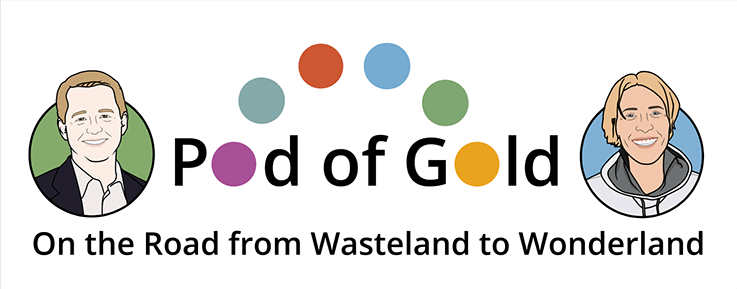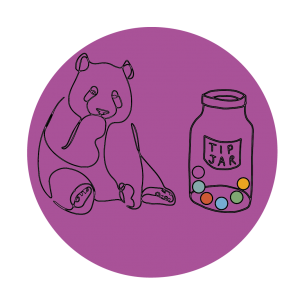We need to support social impact work now more than ever. For the sake of our environment, for our health and wellbeing, we need people working to make a difference. Unfortunately, work for the good of others isn’t always work that pays. How can we sustain social and environmental work in the long term? In this episode, we speak with Kerryn Krige, a specialist in social entrepreneurship, about new economic models for social impact and solidarity.
Posts
How can we see beyond our current state of oppression, polarization, and extraction to build a better future? We asked Anne Snick to share insights from her brilliant Young Persons’ Guide to the Future.
Do you have the feeling that life is getting harder than ever? Not only do we grapple with big issues like climate change, but every day tasks sometimes seem increasingly complex. But what if a simple shift in perspective could change everything? In this episode, we’re speaking with Jon Jandai, who not only thinks life is easy, but he can prove it too.
We need consensus to tackle the looming problems of climate change and economic inequality. Digital tokens and blockchain technology could help us do just that. In this episode, we speak with Andrea Baronchelli, an Associate Professor of Mathematics at City, University of London. We ask him about his research on the token economy and how decentralized digital platforms will shape our future.
Eating less meat is one thing we can all do to reduce our contribution to the climate crisis, but making changes to our diets isn’t always easy. In this episode, we speak with Chef Alejandra Schrader about her Low-Carbon Cookbook and Action Plan to get some tips for eating a more plant-based diet and reducing food waste.
In 1934, Simon Kuznets developed the modern concept of a gross domestic product to measure the market value of all goods and services produced by a country. Nearly 90 years later, our measures of economic growth remain blind to the extreme inequality and environmental degradation produced by “business as usual”. We need a new tool that help guide us on a path to greater wellbeing for people and planet. In this episode, we’re speaking with Michael Green, CEO of the Social Progress Imperative. We talk to Michael about his new measure, the Social Progress Index, and how it could change the way we think about economic success for the better.
In this episode, we speak with Emma Heiling, one of the co-founders of ClimaTalk and a masters student in environmental policy at Sciences Po. Through her work, she’s demystifying climate policy and giving people the information they need to act fast on the climate crisis.
Is there an inherent conflict of interest in ‘sustainable finance’? In this episode, we speak with Theodor Cojoianu, an associate professor at the University of Edinburgh who works at the intersection of sustainability, data science, and finance. We ask him to explain the world of sustainable finance and help us understand what needs to change to make our planet’s health the bottom line for businesses.
An explosion of remote work opportunities has given people the freedom to build all new kinds of lives in all different kinds of places. But how will this growing movement impact our environment? In this episode, we speak with J Mendes (the No Footprint Nomad) about cultivating a nomadic lifestyle that’s ALSO sustainable.
Our food system is broken, producing massive amounts of waste in some places and leaving people starving in others. (Not to mention the damage our agricultural practices are doing to the environment.) In this episode, we speak with Lujain Alqodmani from EAT about what needs to happen so all people can eat food that’s both healthy and sustainable.
The industrial production of beef comes at a major cost to the environment, degrading soil quality and emitting extreme amounts of greenhouse gas into the atmosphere. But what if there was a better way? In this episode, we speak with Langdon Hill, who’s turned about 20,000 acres of Arizona desert into a ranch laboratory to see if it’s possible to raise cattle in a way that nourishes the environment instead of breaking it down.
Imagine if the science taught in schools put the health of our planet front and center. In this episode, we speak with Eugene Cordero, a professor at San Jose State University who’s created the Green Ninja science curriculum to foster the next generation of environmental stewards.
Advancements in modern medicine have made us healthier and improved our quality of life. But at what cost? In the pursuit of science, many of us have lost touch with indigenous modes of healing. We spoke with Olatokunboh Obasi, an herbalist and teacher in Puerto Rico, about the wisdom of indigenous teachings that can bring us in better balance within ourselves and with nature.
There are over 2.69 billion active online gamers in the world. Most of them just want to have some fun in a digital reality. But what if we could mobilize those masses to make a difference in the real world? In this episode, we speak with Kayla Anderson, a gamer, streamer, and content creator, about the transforming the gaming community into a force for climate action.
Ever feel intense anxiety over the deteriorating state of our planet? Good news: you’re not alone. Even better news: there’s help. In this episode, we speak with climate psychologists Megan Kennedy-Woodard and Patrick Kennedy-Williams who have made it their mission to help people turn climate anxiety into climate action.
Making a difference in the fight against climate change doesn’t have to be complicated. Sometimes the simplest solutions are the best. In this episode, we speak with Selva co-founder Harry Hely-Hutchinson about how people can easily offset their carbon footprints by funding the planting of trees.
What can we learn from recollections of the Ice Age about climate change today? Veli Albert Kallio is an ethnoclimatologist who uses history from indigenous peoples to evaluate our current climate crisis. Through this lens, we can see the ghosts that may come back to haunt us–hopefully in time to do something about it.
In this episode, we speak with Donna Reitano and Ajay Mehta, two of the founders of em4. Through their work, they help social impact organizations in the Global South build capacity to increase their reach and efficacy. We ask their advice for others trying to do the same.
We have a massive waste problem, with hundreds of millions of tons of garbage going into landfills every year. In this episode we talk to Richard Perl, CAO of TerraCycle, about the economics driving this massive waste issue and what we can do to recycle better and phase out single use packaging.
In this episode, we talk about how cities can recover economically from the COVID-19 pandemic and launch into a greener and more equitable form of urban life with NYC Comptroller, Scott Stringer.
Mel and Stef take a closer look at our last four interviews, drawing connections and painting a picture of the future based on key nuggets from past episodes.
With the birth of decentralized platforms, like block-chain, we’re seeing new possibilities open up for people, not just in world of crypto-currency, but as a way to securely share data and knowledge of all kinds. In this episode, we’re speaking with Michel Bauwens, a Belgian researcher and founder of the Peer-to-Peer foundation. His work focuses on the capacity of peer-to-peer theory to enable the growth of our knowledge commons and foster a more distributed, equitable, and ecological society.
Industrial agriculture has led to deforestation, land degradation, and biodiversity loss around the world. In this episode, we’re speaking with Festus Kiplagat, an expert in agroforestry and the founder of Green Planet Initiative 2050 in Kenya, who is working to reinstitute indigenous farming practices that can restore the land.
In our relatively short existence as a species, the human race has had a dramatic impact on the Earth. But what if human society could emulate and collaborate with nature rather than trying to dominate it? In this episode, we’re speaking with Dayna Baumeister, a partner at Biomimicry 3.8 and director of the Biomimicry Center at Arizona State University. Dayna’s work is all about how we as humanity can learn from the millions of other species on the planet to improve our lives and live in greater harmony with nature.
If the entire history of the planet Earth were a novel, readers of the book who got to our current chapter might start worrying about the possibility of an unhappy ending. Luckily for us, that story is not completely written yet, which means we have a say how it goes. In this episode, we speak with Mary Alice Arthur, a story activist who empowers people and organizations through storytelling to create positive systemic shifts.
How can we mobilize people en masse to act on behalf to the environment? Maybe it’s through song and dance. In this episode, we speak with Kofi Debrah, co-founder of Oko Forest and one of the producers of the Asa Baako music festival in Ghana, where change makers can come together to ‘party with purpose’. Listen as we talk agroforestry, neocolonialism, and the power of culture and creativity to make a positive impact on the planet.
Extinction Rebellion is a global movement to get the world’s governments to address the climate and ecological emergency. What started in the UK in 2018 has now grown to include 1145 groups in 72 countries around the world. In this episode, we speak with Christina See, a core organizer in New York, to learn more about how this movement has brought in so many people from such a wide array of backgrounds and what it will take to save ourselves from extinction.
Until destructive fossil fuel extraction practices are ended, until the rights of nature are restored, until the world comes together to face the climate crisis, we will not stop fighting. That’s Nnimmo Bassey’s message to the world. Nnimmo is an environmental and human rights activist working out of Nigeria. He has been involved with countless environmental advocacy groups, including Friends of the Earth International, Environmental Rights Action, and the Health of Mother Earth Foundation. In this episode, he shares his vision of a world that dances to a new beat.
What if we could turn back the clock on climate change? True Carbon, a start-up founded by Sebastian and Lars Graf, is trying to do just that. By creating a marketplace to incentivize the use of ‘carbon negative’ farming techniques, True Carbon could lead the way in storing greenhouse gases in the Earth’s topsoil and reversing the damage we’ve done to our atmosphere.
Joseph Bonasia and Gary Robbins have a unique approach to protecting our environment: they are working to secure legal rights for rivers and other bodies of water in Florida. Securing the “rights of nature” would give citizens and municipalities the authority to sue polluters on behalf of natural resources and the people who share them. Joe and Gary emphasize that as humans, we are not separate from nature, but an interdependent part of global ecosystems. They want our legal system to reflect that interdependence.
What if you could pick up a book and learn how to transform your entire community in a single hour? That’s what Faye Cox is working on with her startup called Hourbooks. She’s on a mission to empower people to live more inclusive, resilient, and sustainable lifestyles. Hourbooks is the gateway.
Gwendolyn Hallsmith, founder of the Headwaters Garden and Learning Center ecovillage, talks about how our money system has gotten out of balance and what it will take to get our world back on track. Bonus: she sings!
What will it take to make air pollution a thing of the past? According to Kristian Lande, it’s all about decentralizing data. His start up, AirVeraCity, aims to give people direct access to the information they need to take local action on air quality.
Declan Kennedy is one of the early founders of the Global Ecovillage Network, empowering communities to grow in harmony with nature.
Mel and Steff interview Clarissa da Costa, an expert in infectious diseases, and Xinjing Jiang, a student from Wuhan, to discuss the potential fallout of the COVID-19 pandemic.




